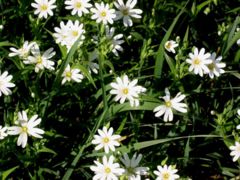Stellaria holostea: Difference between revisions
No edit summary |
No edit summary |
||
| (3 intermediate revisions by 2 users not shown) | |||
| Line 1: | Line 1: | ||
{{ | {{SPlantbox | ||
| | |familia=Caryophyllaceae | ||
| | |genus=Stellaria | ||
| | |species=holostea | ||
| | |common_name=Addersmeat, Greater Stitchwort, Easter Bell | ||
| | |name_ref=Flora - A Gardener's Encyclopedia | ||
| | |habit=herbaceous | ||
| | |habit_ref=Flora - A Gardener's Encyclopedia | ||
| | |Min ht box=20 | ||
| | |Min ht metric=in | ||
| | |Max ht box=24 | ||
| | |Max ht metric=in | ||
| | |height_ref=Flora - A Gardener's Encyclopedia | ||
| | |Min wd box=3 | ||
|Min wd metric=ft | |||
|Max wd box=7 | |||
|Max wd metric=ft | |||
|width_ref=Flora - A Gardener's Encyclopedia | |||
|lifespan=perennial | |||
|life_ref=Flora - A Gardener's Encyclopedia | |||
|exposure=part-sun | |||
|sun_ref=Flora - A Gardener's Encyclopedia | |||
|features=flowers | |||
|flower_season=early spring, mid spring, late spring, early summer, mid summer, late summer | |||
|flower_ref=Flora - A Gardener's Encyclopedia | |||
|flowers=white | |||
|Temp Metric=°F | |||
|min_zone=5 | |||
|usda_ref=Flora - A Gardener's Encyclopedia | |||
|max_zone=10 | |||
|image=Stellaria holostea Grote muur (1).jpg | |||
|image_width=240 | |||
|image_caption=Stellaria holostea | |||
}} | }} | ||
'''''Stellaria holostea''''' ('''Addersmeat''', or '''Greater Stitchwort''') is an [[ornamental plant]] native of [[Europe]]. | |||
It can grow up to 50cm in height, with leaves that are long, narrow and fresh green.<ref name="complete">Complete British Wildlife, ISBN 9780583336383</ref> The flowers are white, 20-30mm across and have five distinctive petals split to about half way down.<ref name="complete"/><ref>Nature Guide to the Lake District, ISBN 0860204030</ref> | |||
{{Inc| | |||
Stellaria holostea, Linn. Easter Bell. A hardy perennial, erect, 6-18 in. high, simple or somewhat branched, from a creeping rootstock: lvs. sessile, lanceolate, 1-3 in. long: fls. white, abundant, in a terminal leafy panicle; sepals one-half or two-thirds as long as the petals. May, June. Eu., Asia.—This and the next are desirable for dry banks where grass will not grow well and for other carpeting purposes. | |||
{{SCH}} | |||
}} | |||
==Cultivation== | |||
===Propagation=== | |||
' | |||
===Pests and diseases=== | |||
==Varieties== | |||
==Gallery== | |||
<gallery perrow=5> | |||
Image:Upload.png| photo 1 | |||
Image:Upload.png| photo 2 | |||
Image:Upload.png| photo 3 | |||
</gallery> | |||
==References== | |||
<references/> | |||
<!--- xxxxx *Flora: The Gardener's Bible, by Sean Hogan. Global Book Publishing, 2003. ISBN 0881925381 --> | |||
<!--- xxxxx *American Horticultural Society: A-Z Encyclopedia of Garden Plants, by Christopher Brickell, Judith D. Zuk. 1996. ISBN 0789419432 --> | |||
<!--- xxxxx *Sunset National Garden Book. Sunset Books, Inc., 1997. ISBN 0376038608 --> | |||
==External links== | ==External links== | ||
{{ | *{{wplink}} | ||
{{ | {{stub}} | ||
__NOTOC__ | |||
Latest revision as of 16:35, 17 June 2010
| Stellaria holostea subsp. var. | Addersmeat, Greater Stitchwort, Easter Bell | |||||||||||||||||||||||||||||||||||||||||||||||||||||||
|---|---|---|---|---|---|---|---|---|---|---|---|---|---|---|---|---|---|---|---|---|---|---|---|---|---|---|---|---|---|---|---|---|---|---|---|---|---|---|---|---|---|---|---|---|---|---|---|---|---|---|---|---|---|---|---|---|

|
|
| ||||||||||||||||||||||||||||||||||||||||||||||||||||||
| ||||||||||||||||||||||||||||||||||||||||||||||||||||||||
Stellaria holostea (Addersmeat, or Greater Stitchwort) is an ornamental plant native of Europe.
It can grow up to 50cm in height, with leaves that are long, narrow and fresh green.[1] The flowers are white, 20-30mm across and have five distinctive petals split to about half way down.[1][2]
| Standard Cyclopedia of Horticulture |
|---|
|
Stellaria holostea, Linn. Easter Bell. A hardy perennial, erect, 6-18 in. high, simple or somewhat branched, from a creeping rootstock: lvs. sessile, lanceolate, 1-3 in. long: fls. white, abundant, in a terminal leafy panicle; sepals one-half or two-thirds as long as the petals. May, June. Eu., Asia.—This and the next are desirable for dry banks where grass will not grow well and for other carpeting purposes. CH
|
Cultivation
Propagation
Pests and diseases
Varieties
Gallery
-
photo 1
-
photo 2
-
photo 3
References
External links
- w:Stellaria holostea. Some of the material on this page may be from Wikipedia, under the Creative Commons license.
- Stellaria holostea QR Code (Size 50, 100, 200, 500)
